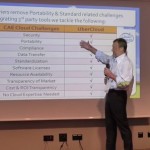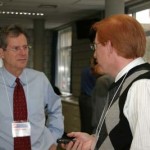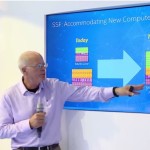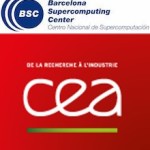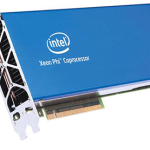In this video from ISC 2015, Wolfgang Gentzsch from The UberCloud presents: HPC Workloads Using Docker. “The UberCloud Project provides an environment to run HPC workloads on a variety of cloud providers. Wolfgang elaborates on the projects and provides his experience about the roadblocks towards a more flexible cloud-backed HPC future.”
Archives for July 2015
Agenda Posted for HPC User Forum, Sept. 8-10 in Broomfield
IDC has published the agenda for their next HPC User Forum. The event will take place Sept. 8-10 in Broomfield, CO.
Knights Landing Prototype Powers Cosmology at ISC 2015
In this video from the Intel booth at ISC 2015, Dr Juha Jäykkä, COSMOS System Manager at University of Cambridge describes a cosmology demonstration running on prototype Intel Knights Landing and Omni-Path hardware. “At ISC 2015, unveiled new details for its future generation high performance computing products, including the first public “powered-on” demonstration of the Intel Omni-Path Architecture, a next-generation fabric technology optimized for HPC deployments.”
Coral and Intel’s Scalable System Framework – The Path to Exascale
“HPC has reached an inflection point with the convergence of traditional high performance computing and the emerging world of Big Data analytics. Intel’s HPC Scalable System Framework enables an unprecedented level of system balance, performance, and scalability necessary to meet the demands of bot compute- and data-intensive workloads, today and well into the future.”
Compute Canada to Renew National Research Computing Infrastructure
Today Compute Canada announced funding to renew and consolidate the Canadian national platform for advanced research computing. Compute Canada and its regional partners ACENET, Calcul Quebec, Compute Ontario, and WestGrid will receive close to $75 million through the Canada Foundation for Innovation’s Cyberinfrastructure Initiative competition launched in 2014.
BSC and CEA to Collaborate on HPC Innovation
Today the Barcelona Supercomputing Center (BSC) and French Alternative Energies and Atomic Energy Commission (CEA) announced plans to collaborate on HPC research and technology innovation. Both organizations have signed an agreement to help promoting “a globally competitive HPC value chain and flagship industry”, echoing the European Union strategy in the domain.
Nested Parallelism
The benefits of nested parallelism on highly threaded applications can be determined and quantified. With the number of cores in both the host CPU (Intel Xeon) and the coprocessor (Intel Xeon Phi) continues to increase, much thought must be given to minimizing the thread overhead when many threads need to be synchronized, as well as the memory access for each processor (core). Tasks that can be spread across an entire system to exploit the algorithm’s parallelism, should be mapped to the NUMA node to make them more efficient.
Video: Argonne Presents HPC Plans at ISC 2015
“In April 2015, the U.S. Department of Energy announced a $200 million supercomputing investment coming to Argonne National Laboratory. As the third of three Coral supercomputer procurements, the deal will comprise an 8.5 Petaflop “Theta” system based on Knights Landing in 2016 and a much larger 180 Petaflop “Aurora” supercomputer in 2018. Intel will be the prime contractor on the deal, with sub-contractor Cray building the actual supercomputers.”
Should Users Reset Performance Expectations for Exascale?
“Exascale computers are going to deliver only one or two per cent of their theoretical peak performance when they run real applications; and both the people paying for, and the people using, such machines need to have realistic expectations about just how low a percentage of the peak performance they will obtain.”
Obama Establishes National Strategic Computing Initiative
Today President Obama issued an Executive Order establishing the National Strategic Computing Initiative (NSCI) to ensure the United States continues leading high performance computing over the coming decades.

